Part 82: Interlude: The Triumph of Evil
Interlude: The Triumph of EvilSometimes, evil wins
Tyranny spends a lot of time looking at the psychology of evil. This is most notable on the player side, as on every route you will be pushed into compromises with various unsavory individuals that all end with the player forced to assume the mantle of either a tyrant or one last compromise that keeps the system running. However, the classic appeal of tyranny is that people get to be the tyrant on top, get everything they ever wanted, impress sexual partners, have a cool castle and elite guard force that loves and salutes them, and they can destroy all your enemies forever and everyone wants to be them.
Those of us who have been paying attention should realize that, much like everything else in Kyros' Empire, this fantasy is a complete lie sold by the self-deluded to justify the terrible things they've done in the name of the system.
The Satanic Authoritarian
There are a lot of authoritarian archetypes in fiction and literature, from Sauron to Ahab and everything in between, but a lot of these - in Western traditions anyway - are drawing on Milton's Satan from Paradise Lost. There's an interpretation of Satan as a defiant hero standing up to mean ol' God, and in my reading it doesn't work out. As the poem opens, Satan and his followers are cast into hell entirely because of their own violent and ambitious actions.
Milton posted:
We may with more successful hope resolve
To wage by force or guile eternal Warr
Irreconcileable, to our grand Foe,
Who now triumphs, and in th’ excess of joy
Sole reigning holds the Tyranny of Heav’n.
So spake th’ Apostate Angel, though in pain,
Vaunting aloud, but rackt with deep despare:
Hell sucks! Understatement of the century, I know, but Satan's reply to the unstated charge of dragging all these angels down into Hell with him is not to take responsibility and ask God to spare his followers, or to repent and throw himself on God's mercy, but to double down on the same power seeking actions that got him and his thrown into the lake of eternal fire. Rather than showing any empathy for the plight of his followers, Satan reveals himself to be spiteful and petty, animated by nothing more than a desire to gain some small revenge on an omnipotent God.
Milton posted:
Fall’n Cherube, to be weak is miserable
Doing or Suffering: but of this be sure,
To do ought good never will be our task,
But ever to do ill our sole delight,
As being the contrary to his high will
Whom we resist. If then his Providence
Out of our evil seek to bring forth good,
Our labour must be to pervert that end,
And out of good still to find means of evil;
Which oft times may succeed, so as perhaps
Shall grieve him, if I fail not, and disturb
His inmost counsels from their destind aim.
Ultimately Satan shows his cynical worldview in the next few lines.
Milton posted:
Is this the Region, this the Soil, the Clime,
Said then the lost Arch Angel, this the seat
That we must change for Heav’n, this mournful gloom
For that celestial light? Be it so, since hee
Who now is Sovran can dispose and bid
What shall be right: fardest from him is best
Whom reason hath equald, force hath made supream
Above his equals. Farewel happy Fields
Again, to Satan, what sets rulers above is solely force. It's a worldview entirely consistent with what the angel tells Adam and Eve of the rebellion, where Satan and the devils tried to storm Heaven in cannon fire.
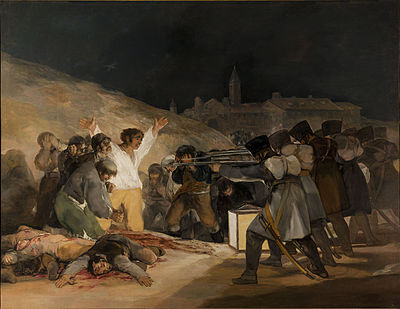
This is Satan's actual goal, gunning down all of his enemies and seizing power for himself.
The poem chronicles Satan's attempts to fight back against God and seize ultimate power for himself, and at the end he accomplishes nothing lasting (God immediately prepares Jesus to go down to Earth and undo Original Sin) and gets himself and his followers all transformed into snakes for his troubles. Why is this relevant for Tyranny?
No One Gets What They Want
Over these two playthroughs we've seen enough of the Archons - who, on paper, have great privileges and get what their heart ostensibly desired. Tunon gets to deliver justice under the benevolent eye of Kyros, and ensure no one goes hungry and there is no war. Nerat gets an endless parade of petty and sadistic amusement. Graven Ashe gets to keep the Disfavored legion and serve with honor.
These are all lies, and none of the Archons are happy. We'll start with Nerat. In theory, Nerat should be the guy benefiting the most from having all of these privileges because he gets to do what we've seen him do all game and get a license to put people on spikes while laughing maniacally when they crap themselves. In practice, Nerat lost himself the minute he started serving Kyros. Let's take a look at his backstory again.
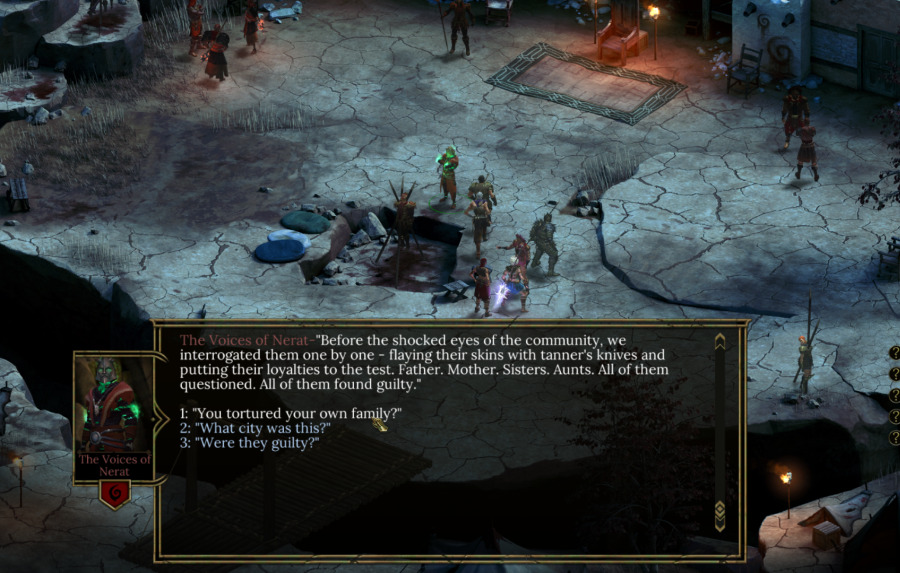
This is the moment where the man who was once a nameless member of House Nerat became the flaming masked abomination in truth, and for all our flattery it's clear this is something our resident psychopath has still not gotten completely over. When asked if he tortured his own family, rather than own up to it he immediately retorts:
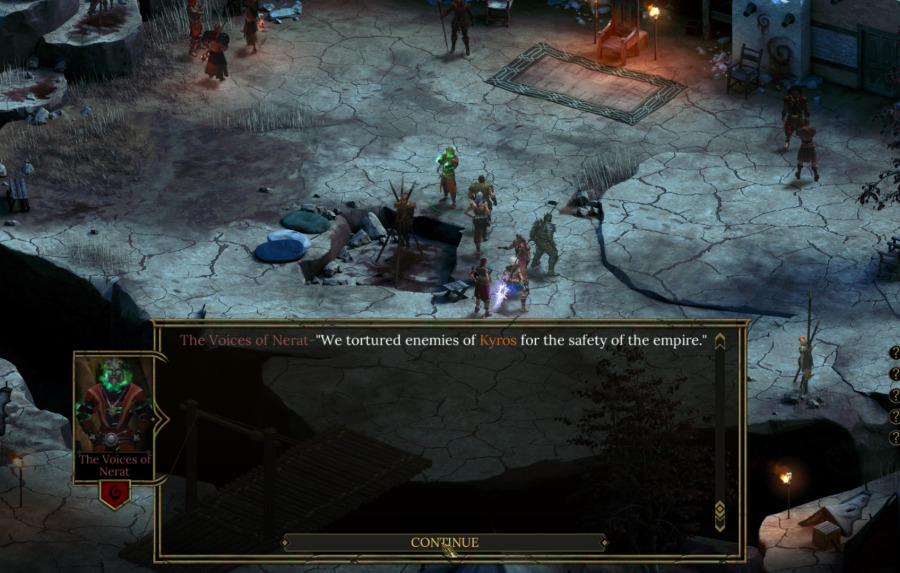
This is not the response of a man who is proud of his actions, but a man who is desperately trying to avoid thinking about them. Why did he do this?
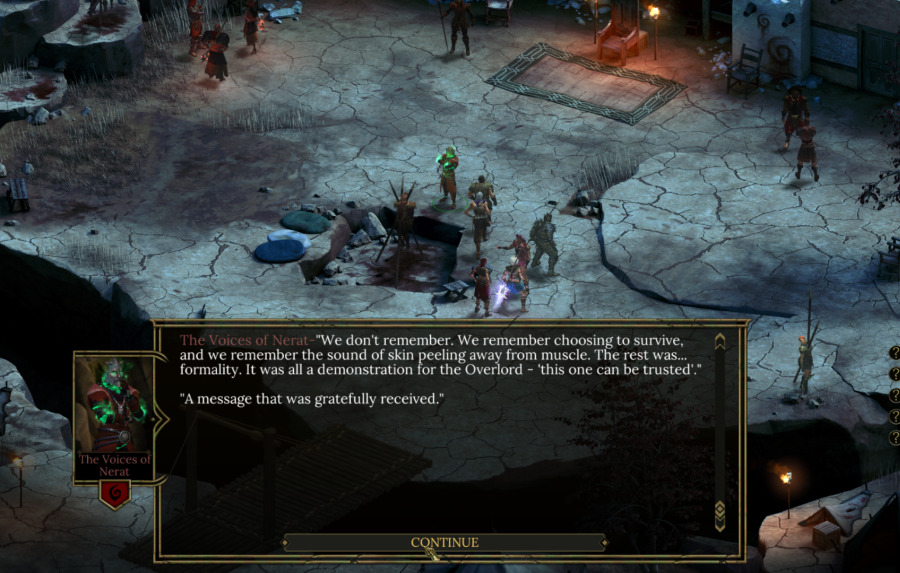
This is entirely so that the man who is now only known as "Nerat" should survive. The great irony is that the Voices of Nerat isn't known by a personal name, but by the name of the family he so cruelly cast aside. As far as I know, the man who was once the son of the Nerat family is never given a personal name, simply the name of his disloyal and mutilated family. We also never learn whether the name of "the Voices of Nerat" was chosen by Nerat or bestowed upon him by Kyros, but that individual man is dead - first broken down by the Archon of Misery after his great cowardly transgression to spare his own life, and now...
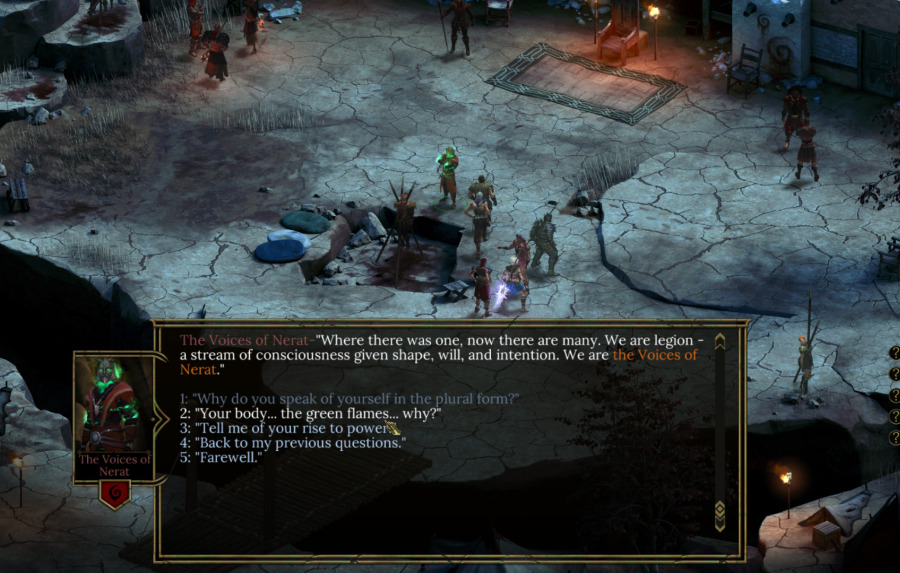
In his attempt to be everything to everyone, Nerat has completely lost himself and the one of the few things that are truly his is the pointless cruelty. It's a desperate attempt to reclaim what he lost and convince himself he still has the power to be himself, something he fails at at the slightest lapse in concentration.
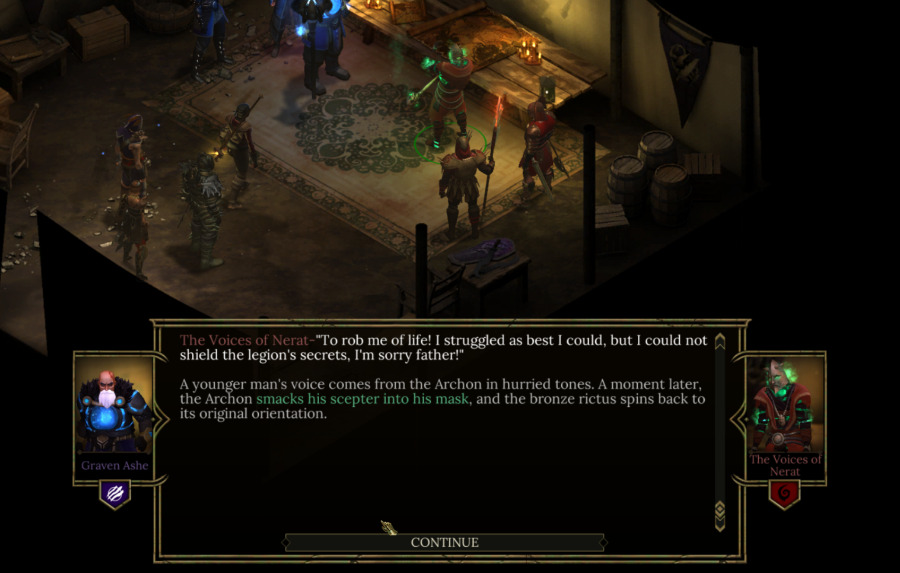
Is it a deliberate attempt to get under Ashe's skin, or is it an actual loss of control because no one is paying attention to him? Who cares? What's important here is that Nerat is no longer the man he once was. That man is dead, dying under the Archon of Misery's knives just as surely as if he'd been the tortured instead of the torturer. The man whose ultimate goal is survival has lost himself, and has become nothing more than a vehicle to indoctrinate the Scarlet Chorus through transgression the same way he was indoctrinated as an Archon. The only thing left that can truly said to be Nerat, aside from the cruelty, is the nihilistic realization that this is all pointless and you might as well take what you can get before you lose the power game.
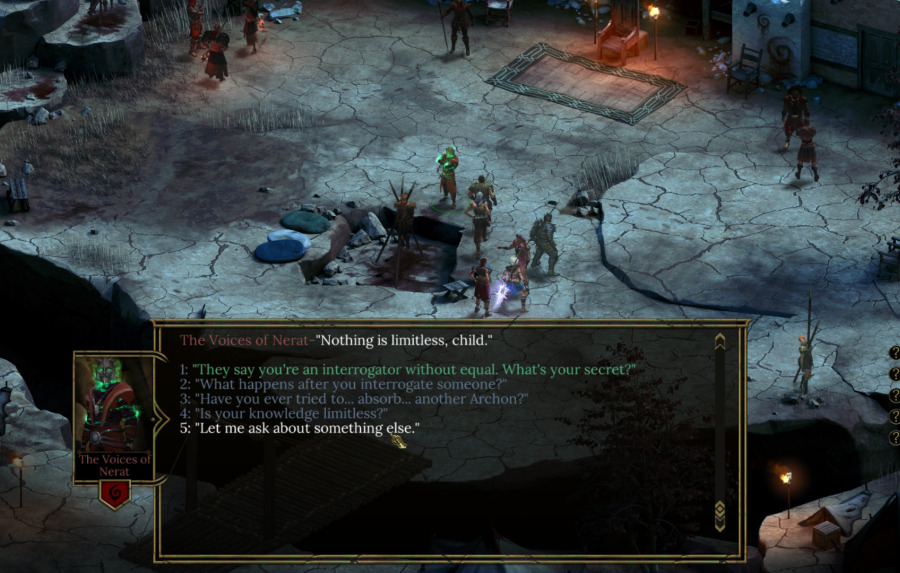
This is why Nerat can go out with a grand spectacle, laughing - he's already dead, these people don't matter, this empire doesn't matter, who gives a fuck? The law is a cynical means to keep power believed in by idiots, the Scarlet Chorus are a bunch of traumatized murderers who (as Noah Caldwell points out) seek death to cleanse them of their Nerat-inflicted transgressions, and Nerat uses all this to avoid confronting the idea that sacrificing his family to rule in hell may not have been worth it after all. Even if you side with Nerat, you can ultimately strip him of his remaining individuality via the sacrifice of a party member and finish the slow death he began long, long ago.
We can look at Ashe next. We've covered Graven Ashe a lot in this LP, mostly through the character of Barik, but it's worth pointing out that despite being portrayed as the honorable old general who serves for Overlord and Country, Ashe is more deceitful than his archenemy Nerat. The thread has pointed out numerous times that the Disfavored path is a path of disillusionment culminating in having to genocide the Stonestalker tribe while you believed you could work with the honorable ex-rebels who showed so much mercy during the Conquest. Because Ashe is a lying liar, he actually has two goals. His stated goal is keeping his troops alive, something his powerset as an Archon ostensibly supports by having him suffer the pains of his men. His actual goal is to get sick power to crush all his enemies like that "sick fuck" Nerat and maybe make out with Kyros along the way, and on some level Ashe is aware of what a fuckup and a coward he is.
Graven Ashe posted:
: Calling me a coward in not so many words? You and Nerat are cut from the same cloth!
Specifically, this is in response to Boris asking if Ashe is afraid of what the Chorus would learn from the Tiersmen. Of course, when push comes to shove, Ashe IS a coward, hiding behind his men from the Fatebinder.
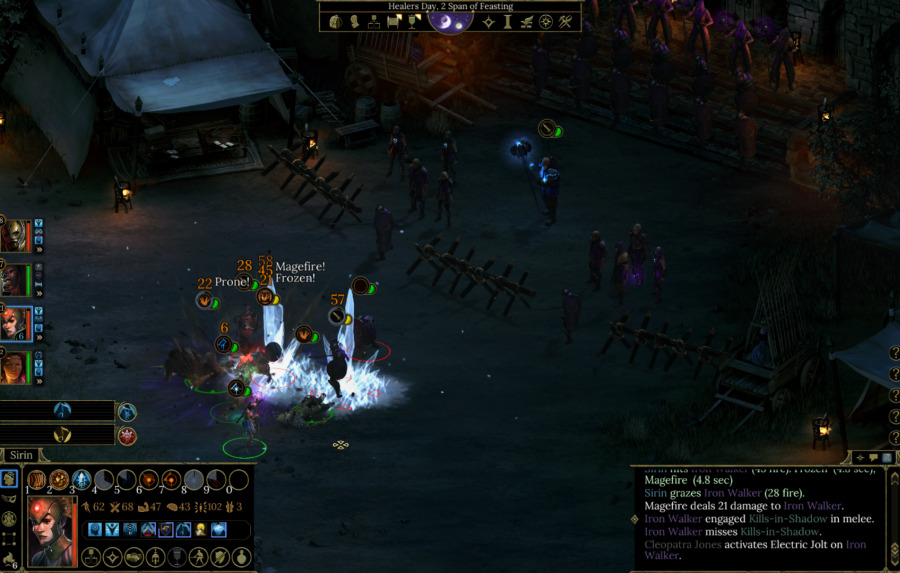
The dissonance goes further, and you can see it in the conversation with Barik. Ashe is a heroic leader who values his troops, which is why he marches them into the Edict of Storms Boris literally warned everyone in the area to stay out of. We've actually pretty well covered Ashe's misadventures thoroughly in this LP - his Disfavored take massive casualties, he constantly strives for the approval of Kyros he will never receive, and we know this from the beginning of the game:
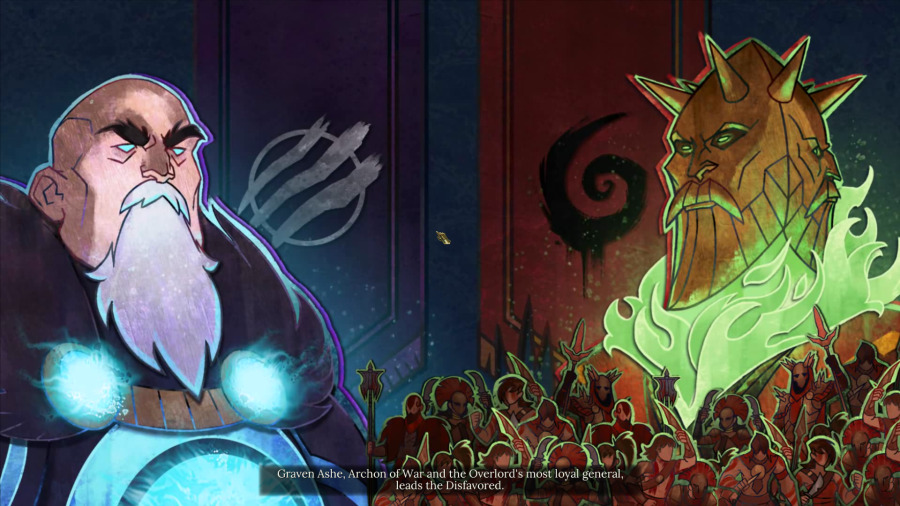
Ashe is Kyros' most loyal general, and Kyros rewards this loyalty by calling his army the "Disfavored" and nuking them with magical storms. We know the Disfavored suffer horrific casualty rates, not just because Erenyos tells us, but because we see and cause them everywhere. Ashe is the classic fascist strongman, and suffers three different appropriate downfalls.
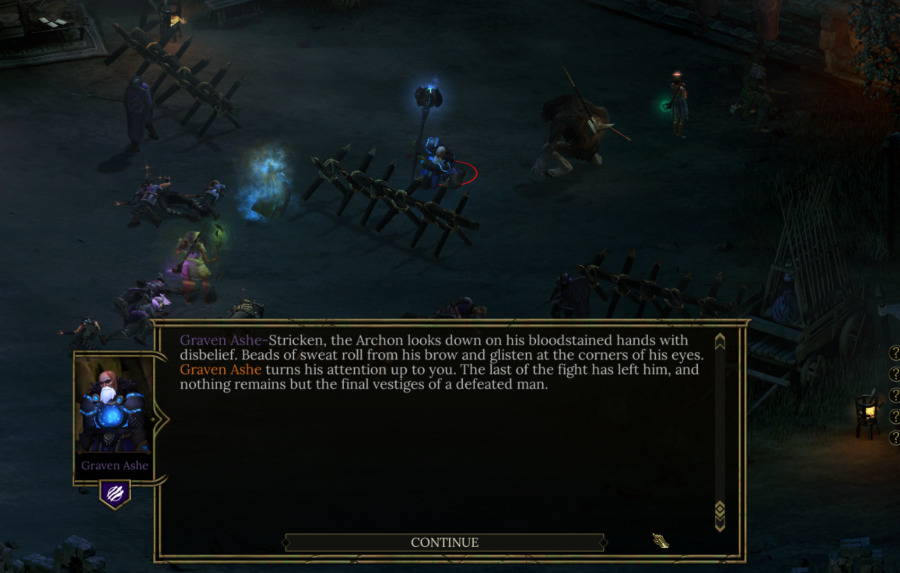
The first is that we beat him at his own game - open combat - and force him to reveal what a worthless hypocrite he is, unable to shed tears over his own men and referring to them as a burden instead of a strength. The second is that we bring him to trial, where he loses all of his dignity and dies ineffectually threatening Tunon, and the last downfall on the Disfavored route is that the player steals the loyalty of the Disfavored and Ashe is ultimately forced to submit because the alternative is losing all of his vaunted power. Much like Satan gets punked on by God for his own sins, Graven Ashe sets up his own downfall by setting down the path of the fascist strongman.
Lastly, we'll look at Tunon, who on the surface seems content with his lot. He originally joined the Empire because he was drawn to the idealism of Kyros' laws, which were a world without war and hunger enforced by the almighty iron hand of the state.
Tunon posted:
: Decades before rumor of Kyros' approach grew in panicked volume, I familiarized myself with the intricacies of her law. It took me no time at all to realize the benefits of our inevitable subjugation.
Beneath that is a truly unhappy man. Tunon's current mask is a mask of iron that symbolically blinds him by covering his eyes, so he cannot truly see the utter disaster Kyros' laws have brought to the land. Characters like Nerat and Mark are able to look at the body of law and recognize them for what they truly are - a mess of rules designed to keep Kyros in power and allow her favored disciples to loot the land to reward themselves for their easily purchasable loyalty. We can tell this from Tunon's mask, as Nunoval and Bleden Mark mention an older mask, made of wood, that was destroyed by Kyros.
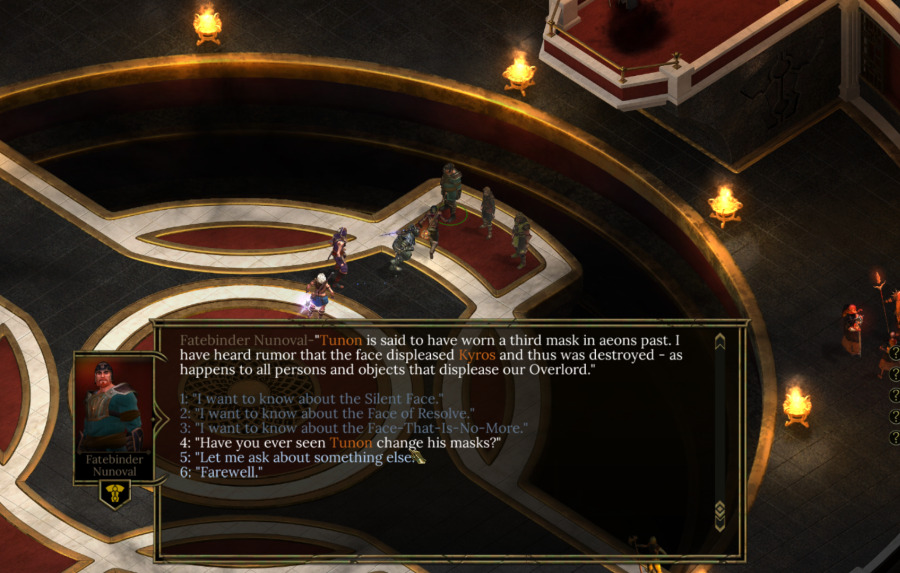
Now, if we ask Tunon about the mask, we get a bit more detail:
Tunon posted:
: In my early days, before the Northern Empire spread to my lands, I fashioned the Mask of Listening out of stern, uncaring wood. This expression of enduring patience harkens the testimony of my petitioners, taking in all evidence before weighing matters in their due course.
This is the mask Kyros destroyed and replaced with the iron mask of resolve, which is the face Tunon wore when he razed the Bastard City. To recap, Tunon read the ideals of Kyros - no hunger, no war - decided to use his power to set up his own set of laws that mirrored Kyros in Tunon's own homeland, laid the groundwork for a peaceful surrender, and was rewarded by being entirely remade in Kyros' image. Tunon despises what he has become, so he avoids thinking about it, and reacts poorly if the Fatebinder is foolish enough to push the issue.
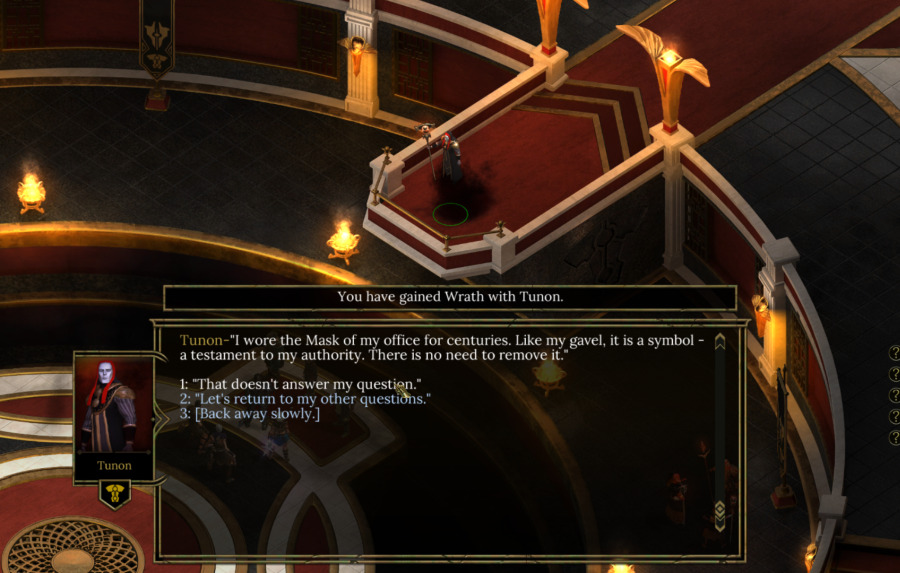
Tunon, in fact, refuses to contemplate what he's become under the mask and kicks you out of the court for asking. This is of course symbolic - the masks merely hide Tunon's biases and coping mechanisms, but the biases are still there. Tunon's story has two separate resolutions, but they both reach the same point. Tunon is forced to confront himself and see what the laws have become, either realizing that Kyros' laws are imperfect, or - on his death - realizing that the laws of Kyros are merely artificial and that he's violated the laws of nature for too long.
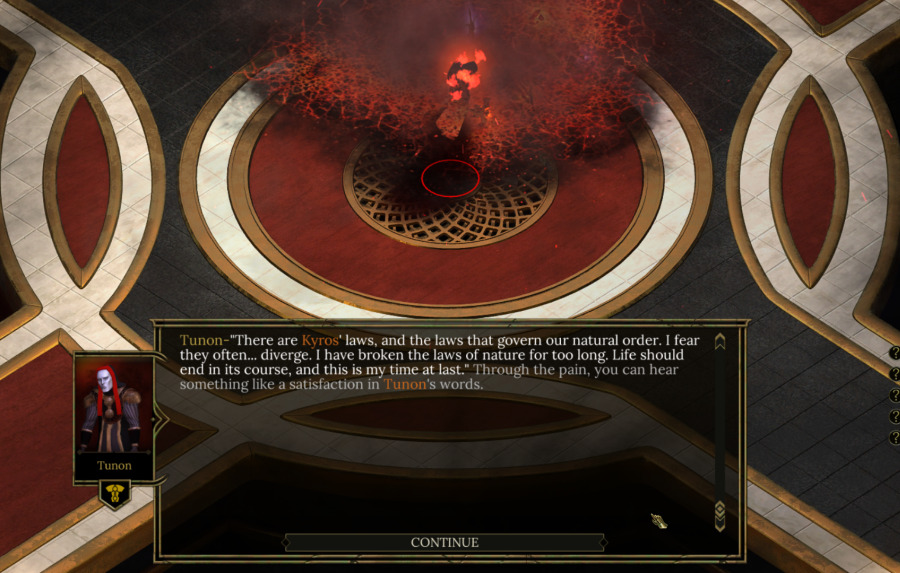
Tunon either dies at peace able to reconcile the wrongdoing he did and that maybe it can be undone, or he joins the player after realizing how badly he fucked up and wanting to do better.
What About Kyros?
We've left one position out of the discussion about how everyone suffers in a tyranny, and that's Kyros. On the surface of it, it looks ridiculous - Kyros is the Overlord, all who see her must bow, she has the final say in all things and literal life or death power over her subjects. In practice, Kyros' power is limited, and rather than being able to enjoy the fruits of having the resources of an entire world at her disposal, Kyros must constantly strive to keep her Archons weak and divided, because the secret is that the Overlord isn't all powerful and if the Archons all decide the system isn't working she's toast.
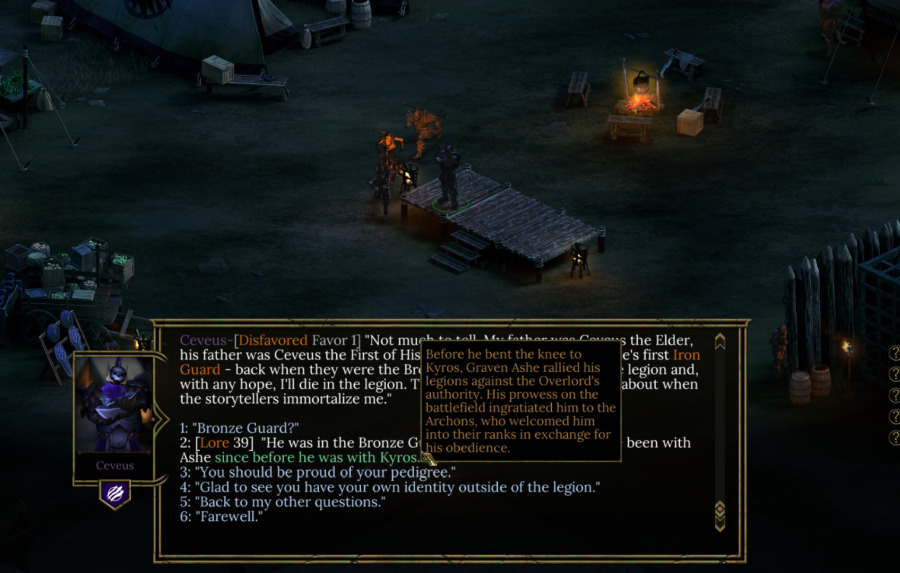
When the Archons all get together and decide that Graven Ashe gets to be on Team Looter, there's not much Kyros can do other than make some pithy comments and rename the once proud freedom fighters to the "Disfavored". Now, it's important to note that precisely one character gives us anything close to an actual description of interacting with Kyros, and that's Sirin describing the assassination attempt.
Sirin posted:
: I was brought out at one of the many lavish gatherings thrown at the place. Kyros loved showing me off. You know - impressing the gathered 'elite'.
This, of course, leads to the real position of Kyros - in name, they are the powerful Overlord whom none dare defy, but in practice, Kyros must spent every waking moment keeping the elites in line, whether it's showing off rare and valuable powers like Sirin, having Tunon and Bleden Mark work to keep Archons down, manipulating the Archons to stay at each others' throats by doing things like teaming up Ashe and Nerat, and maintaining a facade of strength, all for the approval of the elites whose support Kyros desperately needs to stay in power.
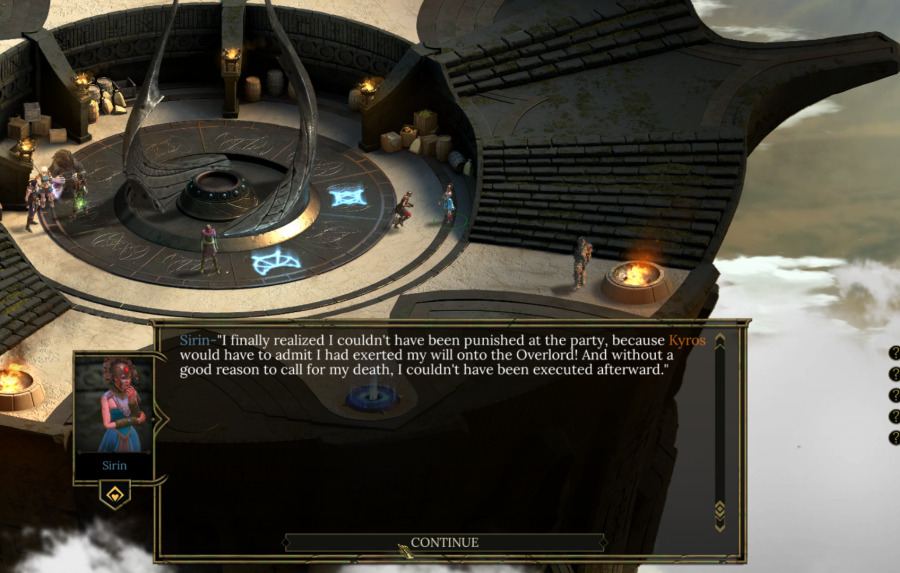
Kyros dare not retaliate against Sirin, because if any of these amoral elites - whom Kyros has deliberately cultivated for their lack of morality to make easy to control with corruption and other nonsense - realize that Kyros can be defeated by a twelve year old girl, somebody like Bleden Mark might be inspired to try again and actually succeed. There are hundreds of Archons who serve Kyros, and Kyros cannot singlehandedly fight them all. So Kyros, by necessity, lives a life of paranoia heightened by the fact that the penalty for failing dictator theater is death for them and any family they may have, to the cheers of the entire empire. It's an open question whether Kyros launched the conquest to actually provide peace and prosperity to all with the mighty power of a dictator, or whether it was all a lie to ensnare well meaning people like Tunon. Thus even the mighty Kyros has clear limits on their supposedly unlimited power, cannot use it to provide for the people or even just retire with their material needs taken care of, and has to fight the same vicious struggle for survival as any starving peasant or fall victim to the very cruelty she fostered.
The same is true of the Fatebinder at the end of the game as well. I keep seeing critics complain about the ending where the Fatebinder begins their own conquest as a power fantasy, but it's really embracing damnation. By following in Kyros' footsteps, the player consigns themselves to the same trap as Kyros, having to continually struggle against their political opponents to maintain a power that can't really provide anything worthwhile save the ability to hurt and destroy. Even on the ascent we see that the player is either shackled to Bleden Mark and the secret police, the violent psychopaths of the Scarlet Chorus, the genocidal fascists of the Disfavored, or the reactionary nobility of the Tiers - who must be placated by vile actions (or anarchy) to maintain power. Did you use the Disfavored and vow that was the last genocide that Terratus would ever see, and that their iron would deliver an egalitarian utopia? Tough shit, the Disfavored want sex slaves and if you don't give them sex slaves you don't have an army. Are you keeping the Scarlet Chorus around as your main military? I sure hope you didn't need that civilian population, because those guys sure as hell aren't going to stop looting the locals, and if you make them do it, well, enjoy losing power because you don't have an army. Ultimately raining fire down upon the northern capital locks you into the same damnation as Kyros - someday, you too will lose the power struggle to some young upstart, and then you will face death.
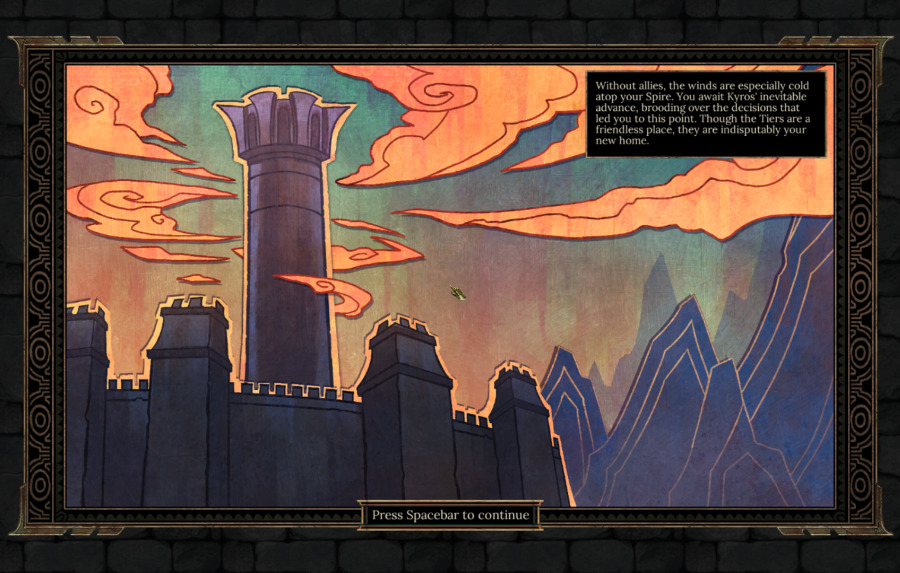
The Triumph of Evil
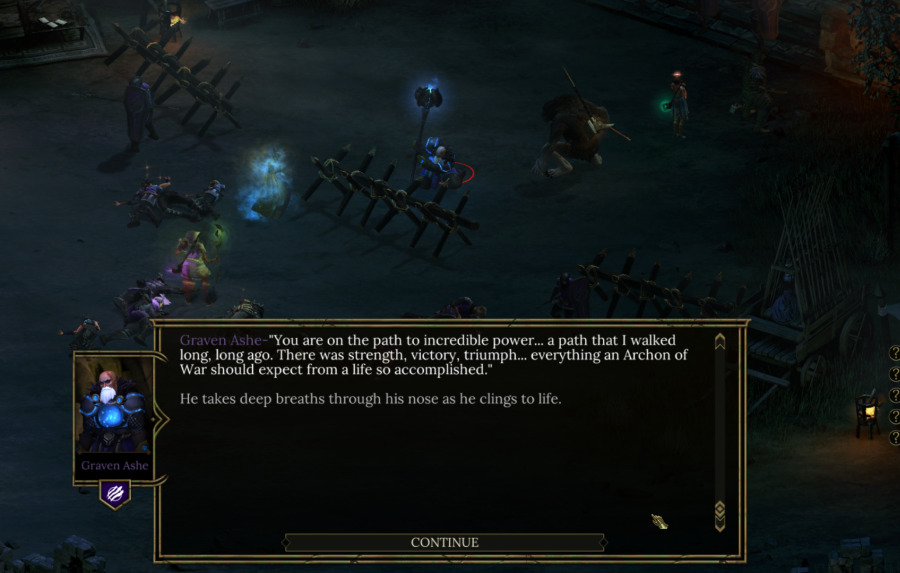
Thus, no one really wins, and the ultimate triumph of evil is laid bare - the entire system is laid out to destroy everyone involved. All of the Archons are gifted individuals. Tunon's legal mind, Graven Ashe's charisma and leadership, and Nerat's intellect could have all been used to do amazing things for the benefit of all had they not been seduced by the false promises of tyranny. Even Kyros herself is obviously an exceptional individual, who could have achieved something truly great had she not been suckered by the vision of imposing her will from above as the only God. Like Milton's Satan, they begin the game reigning in glory until their evil actions turn them small and insignificant. This is the fate that awaits the player at the end, when they either kneel before Kyros in a final compromise with evil, locking themselves into the same destructive system, or they pick up the tyrant's tools to become the new tyrant. The system can produce nothing else. It will never deliver what it promised to either Kyros, the Archons, the Fatebinder, or the peasants, and it will fail all of them, casting them all into Hobbes' brutal struggle of all against all just to survive. You cannot wield the power of cruelty and murder to produce a bold new utopia. You cannot casually engage in violence without either revealing yourself as a psychopath or marking yourself deeply. You cannot stand for anything lest you lose your power or your life. Even should you rise to the top, you will still be shackled to the greed and cruelty of those around you, and you can never, ever, be truly free no matter how many armies you nominally command or what your rank is. It's all self-destructive cruelty all the way down, and we see this in real life too, where Beria let Stalin die and bragged about it, how the slave masters became crueler and more violent towards each other as they became more abusive to their slaves, or how Hitler destroyed Germany then shot himself whining about how the country didn't deserve him while he sent little kids to their deaths. The system wins by convincing the elites it can be beaten to give them everything they ever wanted, and it spits out those elites and destroyed them. That, more than Kyros' ascendency, or the Fatebinder's, is the true triumph of evil.